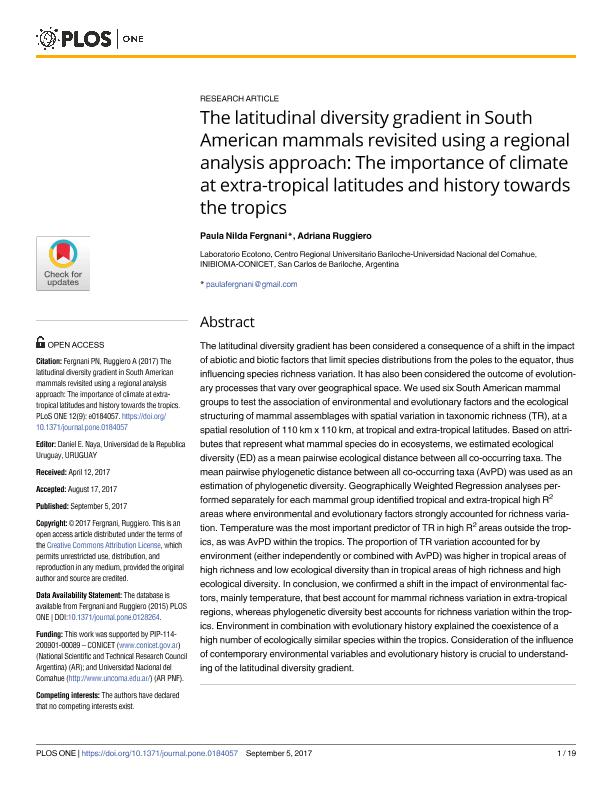Artículo
The latitudinal diversity gradient in South American mammals revisited using a regional analysis approach: The importance of climate at extra-tropical latitudes and history towards the tropics
Fecha de publicación:
05/09/2017
Editorial:
Public Library of Science
Revista:
Plos One
ISSN:
1932-6203
Idioma:
Inglés
Tipo de recurso:
Artículo publicado
Clasificación temática:
Resumen
The latitudinal diversity gradient has been considered a consequence of a shift in the impact of abiotic and biotic factors that limit species distributions from the poles to the equator, thus influencing species richness variation. It has also been considered the outcome of evolutionary processes that vary over geographical space. We used six South American mammal groups to test the association of environmental and evolutionary factors and the ecological structuring of mammal assemblages with spatial variation in taxonomic richness (TR), at a spatial resolution of 110 km x 110 km, at tropical and extra-tropical latitudes. Based on attributes that represent what mammal species do in ecosystems, we estimated ecological diversity (ED) as a mean pairwise ecological distance between all co-occurring taxa. The mean pairwise phylogenetic distance between all co-occurring taxa (AvPD) was used as an estimation of phylogenetic diversity. Geographically Weighted Regression analyses performed separately for each mammal group identified tropical and extra-tropical high R2 areas where environmental and evolutionary factors strongly accounted for richness variation. Temperature was the most important predictor of TR in high R2 areas outside the tropics, as was AvPD within the tropics. The proportion of TR variation accounted for by environment (either independently or combined with AvPD) was higher in tropical areas of high richness and low ecological diversity than in tropical areas of high richness and high ecological diversity. In conclusion, we confirmed a shift in the impact of environmental factors, mainly temperature, that best account for mammal richness variation in extra-tropical regions, whereas phylogenetic diversity best accounts for richness variation within the tropics. Environment in combination with evolutionary history explained the coexistence of a high number of ecologically similar species within the tropics. Consideration of the influence of contemporary environmental variables and evolutionary history is crucial to understanding of the latitudinal diversity gradient.
Palabras clave:
Functional Diversity
,
Phylogenetic Diversity
,
Species Richness
,
Gwr
Archivos asociados
Licencia
Identificadores
Colecciones
Articulos(INIBIOMA)
Articulos de INST. DE INVEST.EN BIODIVERSIDAD Y MEDIOAMBIENTE
Articulos de INST. DE INVEST.EN BIODIVERSIDAD Y MEDIOAMBIENTE
Citación
Fergnani, Paula Nilda; Ruggiero, Adriana; The latitudinal diversity gradient in South American mammals revisited using a regional analysis approach: The importance of climate at extra-tropical latitudes and history towards the tropics; Public Library of Science; Plos One; 12; 9; 5-9-2017; 1-19; e0184057
Compartir
Altmétricas




